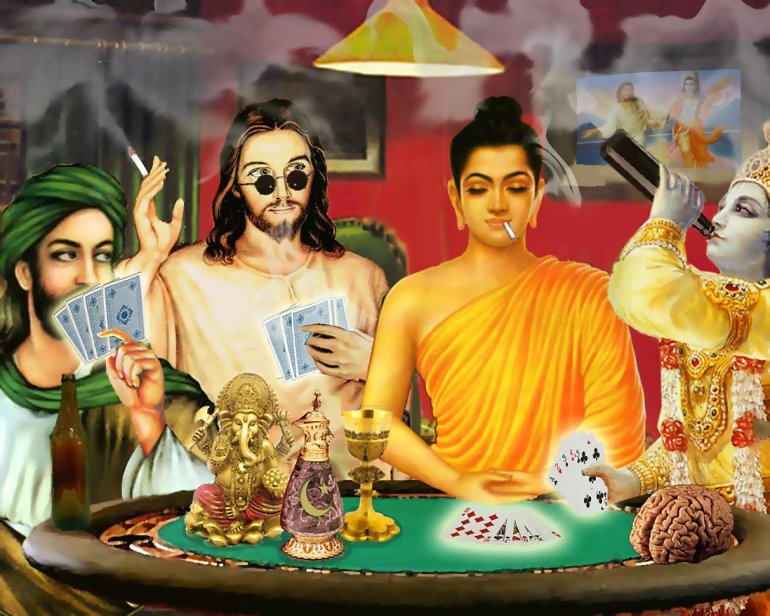
Is gambling a sin? This question has sparked debate for centuries, with religious leaders, philosophers, and everyday individuals offering differing perspectives. Some view gambling as a harmless form of entertainment, while others argue that it promotes greed, addiction, and financial ruin. But where does morality truly lie when it comes to games of chance?
Different religions and cultures have varied stances on gambling. While some faiths strictly prohibit it, others take a more lenient approach or remain silent on the issue.
Additionally, ethical arguments surrounding gambling focus on its potential harm, as well as the idea of personal responsibility.
This article from Casinoz explores gambling through religious teachings, moral viewpoints, and societal perspectives. By examining these angles, we aim to provide a balanced understanding of whether gambling is truly sinful or simply a matter of individual choice.
Gambling in Religious Teachings
Religious perspectives on gambling vary widely, with some faiths strictly prohibiting it and others taking a more lenient approach. Many religious teachings focus on the ethical implications of gambling, particularly its association with greed, financial irresponsibility, and potential harm to individuals and society. While some scriptures explicitly condemn gambling, others provide general moral guidance that can be interpreted in different ways.
In this section, we will explore how major religions, including Christianity, Islam, Judaism, Hinduism, and Buddhism, view gambling and whether it is considered a sin or merely a personal choice.
Christianity
Christianity does not have a direct commandment against gambling, but many Christian teachings warn against the dangers of greed and the love of money. Some of the most commonly cited Bible verses include:
Proverbs 13:11 – “Wealth gained hastily will dwindle, but whoever gathers little by little will increase it.”
1 Timothy 6:10 – “For the love of money is the root of all evil.”
Many Christian denominations discourage gambling due to its potential to lead to addiction and financial ruin. The Catholic Church, for example, does not explicitly forbid gambling but considers it sinful if it leads to harm. Protestant groups, especially evangelical Christians, often oppose gambling outright, citing its encouragement of greed and irresponsibility.
Interestingly, the Bible does not assess the game for money in plain text, even though such entertainment has been known to mankind since time immemorial. Moreover, the Scripture says nothing about it.
Since the Bible does not provide transparent information about gambling, we think logically. Casinos, bingo halls, poker clubs, betting, lotteries, and similar places advertise their services by focusing on positive emotions, which they promise to customers. But everyone knows that the source for them is the possibility of easy money.
It's proved long ago that only a tiny percentage of customers come to the casino just for gameplay. The rest expect to get away with the newly gained money in an "unearned way." And this trip to the casino, way too fun, is fundamentally different from going to a museum or theater.
The Bible speaks quite specifically about those who love money a lot. Read Luke 16:13, I Timothy 6:10 and Ecclesiastes 5:10.
The Bible encourages people to earn a living through work and not look for easy money. For example, Proverbs 10:4 states,
"A slack hand causes poverty, but the hand of the diligent makes rich."
God also tells people to wisely use their talents, savings and even free time. It's hardly wise to spend a night in a casino.
Let's not forget about the possibility of gambling addiction, which is the same fatal predilection as drug addiction or alcoholism. Consequently, gamblers become slaves of habit (see II Peter 2:19).
In a word, the Bible can find many statements in one form or another condemning gambling addiction.
Islam on Gambling
Islam strictly prohibits gambling, categorizing it as haram (forbidden). The Qur'an explicitly condemns gambling in multiple verses, including:
Surah Al-Ma'idah (5:90-91) – “O you who have believed, indeed, intoxicants, gambling, [sacrificing on] stone alters [to other than Allah], and divining arrows are but defilement from the work of Satan, so avoid it that you may be successful.”
Islamic teachings argue that gambling fosters addiction, creates financial instability, and leads to moral corruption. Muslim-majority countries often have strict anti-gambling laws to reflect these beliefs.
Gambling in Judaism
Judaism does not have a clear prohibition on gambling, but rabbinical teachings generally discourage it. Some Jewish scholars argue that gambling is a form of theft since it takes money without providing real value.
The Talmud warns against gambling, and Orthodox Jewish communities often frown upon it. However, some Jewish traditions allow small-scale gambling in social or charitable settings.
Hinduism & Buddhism on Gambling
In Hinduism, gambling is portrayed negatively in ancient texts. The Mahabharata, one of Hinduism’s most significant epics, features a dramatic gambling scene where Yudhishthira loses everything, including his kingdom. This story serves as a warning about gambling’s dangers.
Buddhism discourages gambling as it is seen as an attachment to material wealth, which contradicts the path to enlightenment. The Sigalovada Sutta, a Buddhist scripture, describes gambling as one of the “six ways of wasting wealth.”
Counterarguments: Is Gambling Always Sinful?
Not everyone agrees that gambling is inherently sinful. Many argue that gambling can be a form of entertainment when done in moderation. Some key counterarguments include:
- Personal Responsibility – Many people gamble responsibly without falling into addiction or financial trouble.
- Not All Gambling is Harmful – Social gambling, charity raffles, and low-stakes games do not necessarily lead to moral decay.
- Church-Run Lotteries and Bingo – Some religious institutions run their own gambling events to raise funds, which suggests that gambling is not always seen as immoral.
- Luck vs. Skill – Games like poker involve skill, which some argue separates them from pure chance-based gambling.
Ultimately, whether gambling is a sin depends on intent, consequences, and personal beliefs.
Cultural and Legal Perspectives
Across different cultures, gambling is viewed in various ways:
- Western Countries – Generally accept gambling as a form of entertainment, with casinos, sports betting, and lotteries widely available.
- Asian Cultures – Have mixed views. While gambling is central to Macau’s economy, countries like China and Japan have strict gambling laws.
- Middle Eastern Countries – Predominantly ban gambling due to Islamic teachings.
- Indigenous Cultures – Some Native American tribes operate casinos as a means of economic development.
Legally, gambling is regulated in most countries, with varying levels of restriction based on social and ethical considerations.
The Psychological and Social Aspects
Gambling can have both positive and negative psychological effects:
- Positive: It can be a fun recreational activity when done responsibly. Some argue that certain gambling games sharpen decision-making skills.
- Negative: Problem gambling can lead to stress, depression, anxiety, and financial hardship. It can also encourage unethical behavior, such as cheating or stealing, to recover losses.
The debate over gambling as a sin often boils down to individual choice vs. societal responsibility. While some believe people should have the freedom to gamble, others argue that its risks justify stricter controls.
If you do not consider gambling a sin, here are several fast-paying online casinos for you.
| Casino | Withdrawal methods | Accepted currencies | |



+6
|
$, €, ₽, ₴ | ||



+3
|
$, €, R$, C$ | ||



+1
|
$, € | ||



+4
|
$, C$, zł, kr | ||



+66
|
— |
Conclusion: Is Gambling a Sin?
The question of whether gambling is a sin has no simple answer. It depends on religious beliefs, ethical viewpoints, and cultural norms.
Many religions, especially Islam and some branches of Christianity, strongly condemn gambling. Ethical arguments against gambling focus on greed, addiction, and financial harm.
However, counterarguments suggest that gambling can be harmless fun when done responsibly.
In the end, whether gambling is a sin is a personal decision based on values, beliefs, and the way one approaches gambling. For those who choose to gamble, practicing responsibility and self-control is essential.


















































